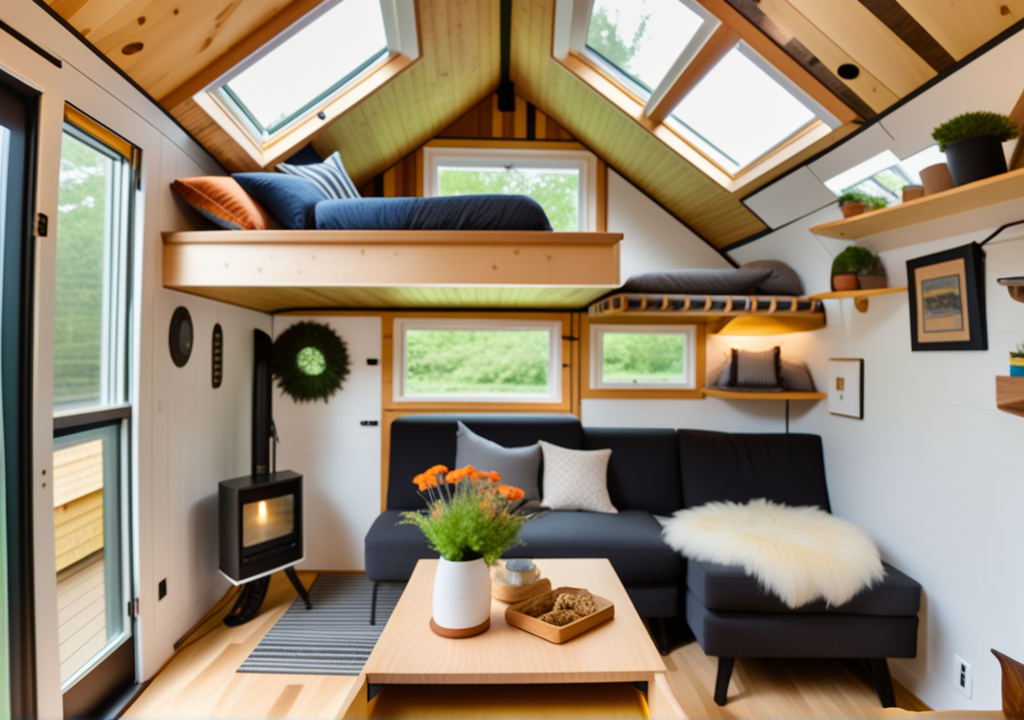Introduction:
In recent years, the tiny house movement has gained significant popularity, offering an alternative and minimalist lifestyle to people seeking to downsize and simplify their lives. Tiny houses, typically measuring under 400 square feet, offer unique benefits and challenges that set them apart from conventional homes. While the idea of living in a tiny house may sound appealing to many, it’s essential to weigh the pros and cons before making such a significant lifestyle change. In this article, we’ll delve into the advantages and drawbacks of tiny house living, helping you make an informed decision about whether this lifestyle is the right fit for you.
Pros of Tiny House Living:
- Financial Freedom: One of the most significant advantages of tiny house living is the reduced cost of living. With significantly lower upfront costs, minimal utility bills, and less maintenance, tiny houses allow homeowners to save money and potentially become debt-free sooner.
- Eco-Friendly Living: Tiny houses have a smaller ecological footprint compared to traditional homes. They require fewer building materials, consume less energy, and encourage a more sustainable lifestyle.
- Simplified Living: Embracing a minimalist lifestyle in a tiny home means decluttering and letting go of unnecessary possessions. This process can lead to reduced stress, increased focus on experiences, and a deeper appreciation for what truly matters.
- Mobility and Flexibility: Many tiny houses are built on wheels, allowing homeowners to have a mobile lifestyle. Whether it’s moving to a new city or traveling the country, tiny houses offer a level of freedom and flexibility that traditional homes cannot match.
- Creative Design Opportunities: With limited space, tiny house dwellers often get creative with their interior design. Clever storage solutions, multi-functional furniture, and unique layouts are common in tiny homes, providing an opportunity for personal expression and customization.
- Lower Environmental Impact: Tiny houses typically consume fewer resources, produce less waste, and require less energy for heating and cooling. For environmentally-conscious individuals, this lifestyle choice aligns with sustainable values.
- Close-Knit Community: Tiny house enthusiasts often form a tight-knit community, sharing resources, ideas, and support. Tiny house events, workshops, and gatherings provide opportunities to connect with like-minded individuals.
- Debt Reduction and Financial Security: By downsizing to a tiny home, individuals can free up money to pay off debts or invest in their future, providing a sense of financial security and peace of mind.
- Escape from a Materialistic Culture: Tiny house living encourages people to prioritize experiences over possessions, helping individuals break free from the cycle of consumerism.
Cons of Tiny House Living:
- Limited Space: The most obvious drawback of tiny house living is the limited living space. For some, the small size may feel restrictive and challenging to adjust to, particularly for those accustomed to larger homes.
- Zoning and Legal Hurdles: Depending on the area, zoning regulations and building codes may restrict the placement and use of tiny houses. Navigating the legal aspects of tiny house living can be complicated.
- Storage Challenges: Downsizing to a tiny home requires letting go of many possessions, which can be emotionally challenging for some. Finding adequate storage space for essentials may also pose a challenge.
- Privacy Concerns: With limited room for separation, privacy can be compromised in tiny houses, especially for those living with family or roommates.
- Limited Resale Market: Tiny houses may not have a well-established resale market, which could make selling your tiny home more difficult if your circumstances change.
- Maintenance and Repairs: Tiny houses, like any home, require regular maintenance and occasional repairs. However, with limited space, accessing and fixing certain areas can be more challenging.
- Limited Hosting Space: Hosting gatherings or accommodating guests in a tiny house can be challenging due to the limited space available.
- Changing Family Needs: While a tiny house may suit a single individual or a couple, it might become less practical if family needs change or grow.
Conclusion:
Tiny house living offers a unique and appealing lifestyle to those seeking simplicity, financial freedom, and eco-conscious living. The pros of tiny house living, such as reduced expenses, environmental benefits, and creative design opportunities, are significant motivators for many individuals. However, it’s essential to acknowledge the cons, such as limited space, zoning challenges, and privacy concerns, which may not align with everyone’s preferences or circumstances.
Deciding whether to embrace tiny house living requires careful consideration of your values, priorities, and long-term goals. If you value simplicity, sustainability, and the freedom to explore new possibilities, a tiny house might be the perfect fit for you. On the other hand, if you crave more space, value convenience, or prefer a more conventional lifestyle, a tiny house may not be the best choice.
Ultimately, tiny house living is a personal choice that demands thoughtful evaluation. Regardless of the decision, embracing the principles of minimalism and sustainable living can positively impact our lives and the environment, regardless of the size of our dwellings.

